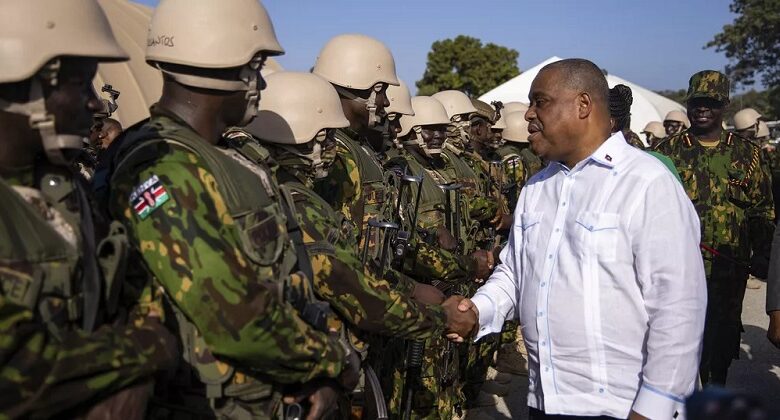Anticipation and Fear as Haiti Welcomes Fourth Major Foreign Intervention to Tackle Gang Violence

News Mania Desk/ Agnibeena Ghosh/28th June 2024
Haiti is currently gripped by a mix of anticipation and fear as the country welcomes its fourth significant foreign intervention aimed at combating gang violence that has engulfed the Caribbean nation. A contingent of several hundred police officers from Kenya arrived early Wednesday and met with Prime Minister Garry Conille as they prepare to deploy in the coming days. The specifics of their mission remain undisclosed, known only to high-ranking officials for security reasons.
The situation in Haiti is dire, with residents expressing high expectations for this intervention. Haitians are desperate and weary of the rampant gang violence that has ravaged the capital, Port-au-Prince, and surrounding areas. This violence has resulted in thousands of deaths, rapes, and kidnappings, leaving hundreds of thousands homeless and exacerbating poverty levels. Mathurin Jean François, a 30-year-old math teacher unemployed due to gang violence, voiced a common plea: “I’m asking the prime minister and the Kenyans to free Haiti from these gangs. Many people are suffering.”
The first contingent of the U.N.-backed foreign police arrived on Monday, marking nearly two years since Haiti initially requested international assistance to quell the escalating violence. This multinational effort will eventually include police and soldiers from the Bahamas, Bangladesh, Barbados, Benin, Chad, and Jamaica, totaling 2,500 personnel. Prime Minister Conille outlined the strategy as a methodical restoration of security, targeting each house, neighborhood, and town in succession.
However, the effectiveness of this mission remains uncertain. Gangs control approximately 80% of Port-au-Prince and are better armed than the Haitian National Police, showcasing their arsenal, including .50 caliber bullets, on social media. In a significant escalation on February 29, gangs launched coordinated attacks, prompting the resignation of Prime Minister Ariel Henry. They overran more than two dozen police stations, forced the main international airport to close for nearly three months, and freed over 4,000 inmates by storming Haiti’s two largest prisons.
The Kenyan-led mission faces significant scrutiny. Sabrina Karim, an assistant professor at Cornell University specializing in conflict and peace processes, highlighted the mission’s complexities: “It’s a very tricky mandate that requires experience and strong local knowledge.” Gaining the trust of Haitians, who have long been skeptical of a government entangled with corruption and gangs, is crucial. “The accountability piece is really important,” Karim added, emphasizing that public acceptance hinges on the mission’s effectiveness and transparency.
Historical precedents of foreign interventions in Haiti are not encouraging. The U.N.’s peacekeeping mission from 2004 to 2017 was tainted by allegations of sexual assault and the introduction of cholera, which claimed nearly 10,000 lives. Kenyan police also have a checkered history, with accusations of abuses including extrajudicial killings and recent incidents of firing on protesters.
Humanitarian organizations are concerned about the potential risks to children. According to the U.S.-based nonprofit Save the Children, 30% to 50% of armed group members in Haiti are children, driven to join due to hunger and desperation. The nonprofit stresses that these children, victims of rights violations, should be treated with care and not as combatants.
As the Kenyan police begin their mission, the Haitian populace watches with cautious hope. Frantz Pradieu, a 39-year-old carpenter, expressed this sentiment: “There’s a breeze of hope in the air. If the Kenyans work hard, maybe in a few months, the economy will turn around. This has been a catastrophic situation for the last three years. Everybody is living in fear. People are being kidnapped. People are being raped. This needs to stop.”
The intervention’s success will hinge on the Kenyan police’s ability to effectively tackle the gangs, restore security, and win the trust of the Haitian people, providing a glimmer of hope amidst years of turmoil and violence.






